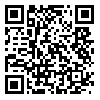BibTeX | RIS | EndNote | Medlars | ProCite | Reference Manager | RefWorks
Send citation to:
URL: http://jdisabilstud.org/article-1-2924-en.html
2- Department of Psychology and Education of Exceptional Children, Allameh Tabataba’i University
3- Department of Assessment and Measurement, Allameh Tabataba’i University
Background & Objectives: Callous–Unemotional traits are characterized by a lack of remorse and emotion, low empathy, and a limited level of guilt which is predictors of severe and stable violence throughout the growth period, and the emergence of these traits at a young age puts a person at risk of committing violent, severe, and chronic antisocial behaviors. The low responsiveness of the group of callous–unemotional traits to the existing therapeutic interventions has caused the field of treatment to be considered one of the most worrying and challenging areas. Regarding the importance of improving the quality of the parent–child relationship to prevent the progression of conduct problems and callous–unemotional traits, we used interpersonal theories (Adler, Sullivan, Winnicott, Balby, and Beebe), each of which introduced components for a healthy parent–child relationship. This research aims to design a parent–child program based on interpersonal theories for children with conduct problems and callous–unemotional traits and validate it.
Methods: This qualitative research employed an inductive content analysis approach, and the research population comprised all the texts published between 1945 and 2020 related to the theories of Sullivan, Adler, Bowlby, Winnicott, Beebe, and Lockman. The sample size was based on the data and the study of the texts continued until the saturation of the data, which was saturated after 20 articles. Based on the obtained components, a two–part parent and child program was designed. To quantitatively check the content validity of the program, two relative coefficients of content validity ratio (CVR) and content validity index (CVI) were used. A total of eight experts answered the questions related to these two indicators. The CVR of the question was scored on a 3–point Likert scale (necessary, necessary but not relevant, and not necessary) and then the value of this index was calculated for each session and the overall package using the Lawshe formula. The CVI was also answered in the three categories of relevance, clarity, and simplicity by eight experts on a 4–point Likert scale.
Results: Based on the research findings, for the parent–child relationship, two main categories of emotional (security, belonging, reflection and sharing of feelings, response to needs, empathy and encouragement) and framework (failure, natural and logical consequences) have been obtained. A two–part program for a parent and child was designed in 30 sessions, and the values of CVI and CVR indicate the high reliability of the designed package. The content validity index for the whole package (S–CVI) was also calculated as 0.975, which indicates a favorable content validity index and content validity ratio values were between 0.75 to 1.
Conclusion: In this research, a parent–child program was designed based on interpersonal theories with the ability to be implemented for children with conduct problems with callous–unemotional traits and was evaluated with high validity by experts. It is recommended to measure its effectiveness on groups of children with conduct problems with callous–unemotional traits.
| Rights and permissions | |
 |
This work is licensed under a Creative Commons Attribution-NonCommercial 4.0 International License. |




